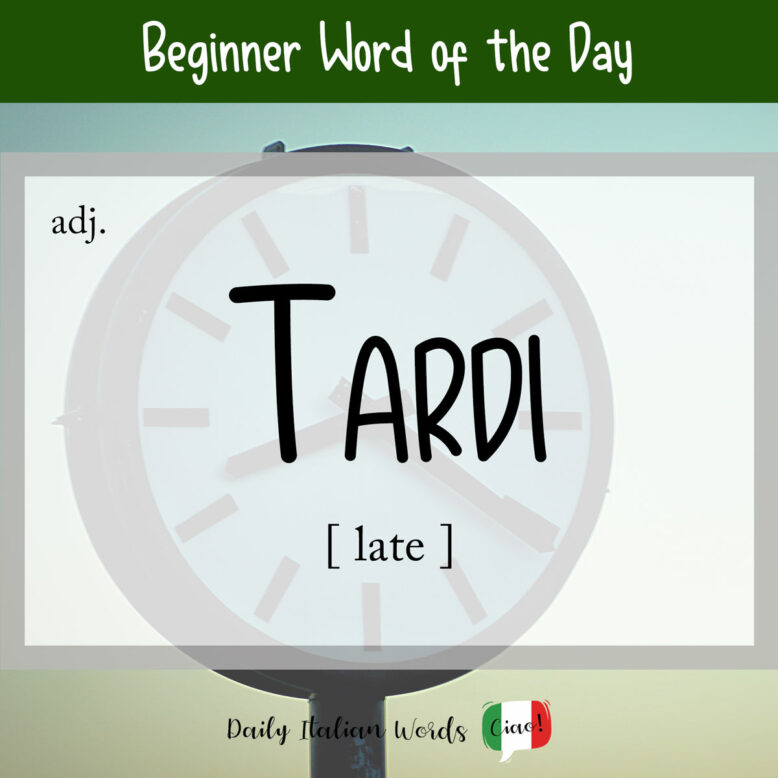One word for late in Italian is tardi, which should be very easy to remember as we have the same word in English, albeit spelt with a word-final ‘y’ instead of an ‘i’. Both the Italian and the English tardy can be traced back to the Latin tardus meaning ‘slow’.

The expressions essere tardi (lit. to be late) and fare tardi (lit. to make late) both mean to be late in Italian. The latter can also be used when you stay up later than expected.
Non è un po’ tardi per andare in banca?
Isn’t it a bit too late to go to the bank?
Ieri sera abbiamo fatto tardi perché ci divertivamo un sacco.
We were up late last night because we were having so much fun.
Farsi tardi, on the other hand, means to get / become late when talking about the passage of time during the day.
Si sta facendo tardi. Dovremmo tornare a casa prima che la mamma cominci a preoccuparsi!
It’s getting late. We should get home before mom starts worrying!

Now let’s have a look at some verbs you will certainly see in the company of tardi:
- arrivare tardi = to arrive late
- tornare tardi = to come back late
- svegliarsi tardi = to wake up late
- alzarsi tardi = to get up late
- andare a letto tardi = to go to bed late
- tirare tardi = to stay up late
Tardi also appears in a number of time-related expressions that you’ll hear on a regular basis.
- più tardi = later
- al più tardi = at the latest
- fino a tardi = until late
- meglio tardi che mai = better late than never
- sul tardi = late-ish, late in the day
- non più tardi di = no later than
- troppo tardi = too late
- non è mai troppo tardi = it’s never too late
And of course, who couldn’t forget about the classic greetings A più tardi! and Ci vediamo più tardi!, both of which are the equivalent of See you later! in Italian.
Ora devo scappare ma ci vediamo più tardi a casa di Luca! – Ok, a più tardi!
I have to run now, but I’ll see you later at Luca’s house! – Ok, see you later!

Closely related to the adverb tardi is the adjective tardo which also means late or slow. Because it is an adjective, the ending changes from -o to -a when describing feminine singular nouns, -i for masculine plural nouns and -e for feminine plural nouns.
If the translation is late, tardo refers to the late part of any given time period, such as tarda mattinata (late morning), tardo pomeriggio (late afternoon), tardo Medioevo (Late Medieval) or tarda età (advanced age).
Translate tardo as slow, and it denotes the slow movements or actions of a person or thing.
Il nuovo caporeparto è un po’ tardo nel prendere delle decisioni.
The new supervisor is a little slow in making decisions.
Essere tardo di mente (lit. to be late of mind) is a pejorative expression for a person who is slow to understand and not very intelligent.
Tardi vs In ritardo
There is another expression Italians use when talking about being late, as in being behind the scheduled time, and that is in ritardo. Let’s see the difference between tardi and in ritardo by analysing these two examples:
- È tardi. Devo tornare a casa. = It’s late. I need to go home.
- Sono in ritardo. Devo tornare a casa. = I’m late. I have to go home.
The important thing to memorise here is that, if you want to say that you or another person is late (to a party, meeting etc.), you have to use the expression essere in ritardo. You can’t say Sono tardi to say I’m late or Luca è tardi to say Luca is late.

Ritardo means lateness, tardiness or delay. A person who is constantly late is known as a ritardatario/a in Italian.
You can use ritardo with more than just people. For example:
Il treno è in ritardo di cinque minuti.
Il treno arriverà con un ritardo di cinque minuti.
The train is 5 minutes late.
The train will arrive with a 5 minute delay.

What can be a bit confusing is that tardi and in ritardo are interchangeable when used with certain verbs. For example:
- Papà arriverà tardi. = Dad will arrive late.
- Papà arriverà in ritardo. = Dad will arrive late. (Dad will be late.)
The former implies that a person, or a transport vehicle, was supposed to arrive at a pre-arranged time and failed to do so. Tardi, on the other hand, can also mean that the person arrived later than expected, but didn’t necessarily fail to commit to a scheduled time.
Papà arriverà a casa tardi perché c’è un grosso incidente sull’autostrada.
Dad will get home late because there’s been a big accident on the highway.
Papà arriverà in ritardo all’appuntamento perché non è suonata la sveglia.
Dad will be late to the meeting because the alarm clock didn’t go off.

Finally, the expression Fare tardi, which we already saw at the beginning of the article, can work as a synonym for essere / arrivare in ritardo. For example:
Dai ragazzi, sbrighiamoci o faremo tardi.
Dai ragazzi, sbrighiamoci o arriveremo in ritardo.
Come on, guys, let’s hurry up or we will be late.
Heather Broster is a graduate with honours in linguistics from the University of Western Ontario. She is an aspiring polyglot, proficient in English and Italian, as well as Japanese, Welsh, and French to varying degrees of fluency. Originally from Toronto, Heather has resided in various countries, notably Italy for a period of six years. Her primary focus lies in the fields of language acquisition, education, and bilingual instruction.


